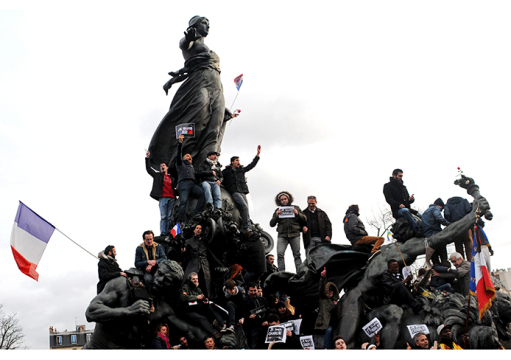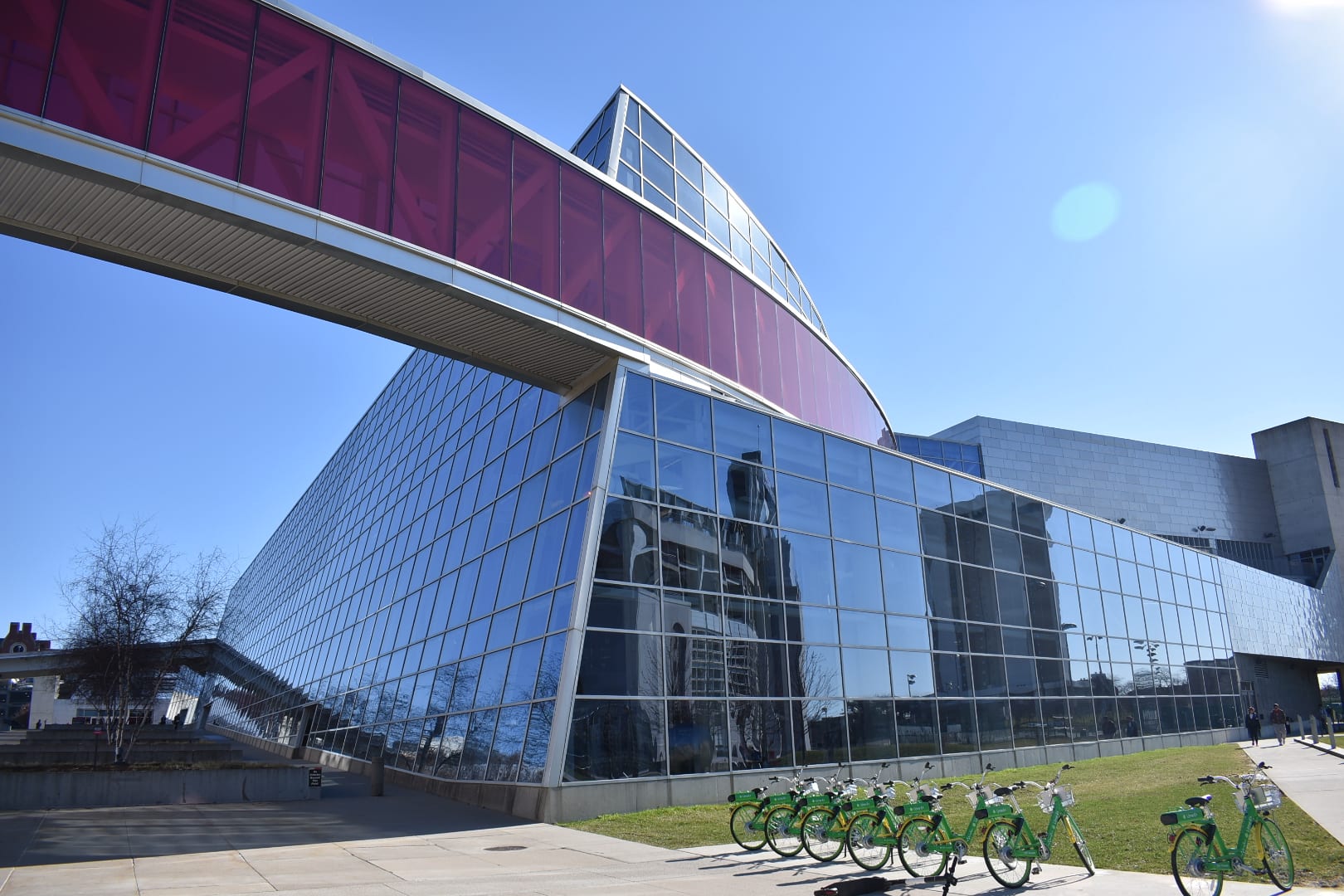
Hundreds of thousands gathered on Place de la Republique prior to march against terrorism in Paris, France on January 11, 2015. Several European heads of state joined the manifestation to express their solidarity following the recent terrorist attacks in France and to commemorate the victims of the attack on French satirical weekly Charlie Hebdo and a kosher supermarket in Paris.
Credit: Courtesy of TNS
The sentiment that spending time abroad as part of your college experience is a grand, perspective-shifting experience isn’t unique. Rather, it verges on cliché: We’ve all heard this story before.
Faculty and staff extol the benefits of studying abroad as part of a holistic education; peers rave of the unique Dionysian blisses one savors in countries beyond one’s own.
The charm — both real and exaggerated — of travel is understood.
And in buying in to this dream of the transformational journey of the American abroad and all the virtues thereof, I signed up for a short-term trip to Paris over winter break.
Of course, this was a big deal. I’d never been to Europe, and, thanks to Ohio State, I’d be making my continental debut on Jan. 1.
What a way to begin a year; to say I was excited is to undersell it.
The Louvre, Notre Dame, Versailles, the Eiffel Tower — the list of attractions in a city as storied and notorious as Paris is inexhaustible.
And for when I — somehow — tired of the sights, I made plans to gluttonously consume crepes and wine and all of the finest gastronomic pleasures of the City of Lights.
But through this giddy anticipation of Parisian wonders, cynic that I am, I remained skeptical of the ability of a quick jaunt in a foreign place to significantly alter the framework of my life.
Sure, I’d probably pack on a few pounds and come home jetlagged, but the idea of my personality morphing from the experience seemed all hype and no substance.
In large part, I stand by that preemptive cynicism.
Yes, the trip was wonderful. I had fun; I made new friends; I saw beautiful things, ate delicious-er ones and nurtured a nascent understanding and appreciation of Francophone culture.
But to say that who I am now is a marked departure from who I was before as a result of visiting France is a lie I won’t tell. It does a disservice to the venture.
What more immediately left a mark was the horrible and unforeseeable tragedy that struck while we visited.
On Jan. 7, shortly before noon, a pair of gunmen shot and killed 12 in and around the offices of Charlie Hebdo, a French satirical publication.
The attack was a barbaric response to cartoons from the publication depicting and mocking Muhammad, a central and revered figure in the Islamic faith. (The act of depicting the Prophet Muhammad is considered blasphemy by some in Islam.)
I was concluding a group visit with the other students and our professor to the Musée Picasso when the shootings occurred less than half a mile away.
We were largely unaware until our professor pulled us aside after the tour and instructed us to retrieve our bags from the check and meet in the lobby as there had been an “incident.”
All we were told was that OSU had called, and that there had been some sort of terrorist attack nearby.
Instructed to stay together as a group, we took refuge in a nearby café. The French-speaking among us asked the employees for the password to their WiFi and, once connected, we sat scouring the Internet for information on what had happened, between croissants and calls to worried parents.
A few hours later, somewhat calmer and much fuller, we left the café and traveled by taxi back to our hotel. This would be our modus operandi for the remainder of the trip: Our freedom to explore independently and use public transit had been taken from us.
In my jetlagged and dehydrated delirium — the French don’t seem to drink water — the gravity of what had happened didn’t register.
But we did register a sort of shock: Caught up in the majesty of the French capital, we were all Parisians. It seemed that we should feel the sting of the murder as keenly as did the true French. Paris had become our city, and our city had been attacked.
In some ways, it still doesn’t seem as though I understand what happened. How could I, as the reverberations of the slaughter continue to develop?
Pictures of millions gathering in spaces where I stood days before seem surreal.
Seemingly even more impossible, however, is the thought that there remain those who believe that violence is an appropriate answer to a disagreement.
It’s trite but true: Violence is never the answer.
Of course what Charlie Hebdo publishes is meant to be incendiary. It is satire at its lewdest, crassest and, often, most biting. The irreverence is paramount and nothing is sacred — even (and especially) the sacred.
Understanding this, it is simple to understand that people find the magazine offensive, distasteful and, sometimes, blasphemous.
That does not excuse the actions of the gunmen.
It is a basic tenet of modern civility that freedom of speech is an inalienable birthright. We might disagree with what others say, but we must allow them to say it.
We must not censor. We must not silence.
It is easy and accurate to say that the ill-conceived actions of a few radicals could outshine the glory of the City of Lights, even if just for a moment. And that is truly unfortunate.
It true that remembering the negative of the slaughter will be easier than remembering the overwhelming positives.
It is sad that my first memory of Paris will be tied with this tragedy, more readily than with the wonderful moments I had studying abroad there.
It seems surreal that a dozen or so bullets can leave more of a mark than the opulence of Versailles and the reverence of Notre Dame.
And it is sadder and more unreal that people died over a disagreement of beliefs. But the good of the world will prevail, as it always does.
And so I choose to remember first the good: the excellent food, the kind people, the beautiful city. I choose to carry with me the unity and pride of the French people and not the tragedy and grief of isolated murders.
We all are not irreverent cartoonists, but we all are survivors. By not tolerating the silencing of innocents, we are championing free speech as it must be championed.
By demanding justice and refusing to respond to violence with violence, we are seeking change as Charlie sought change.
And in that way, it’s true: Nous sommes tous Charlie.


